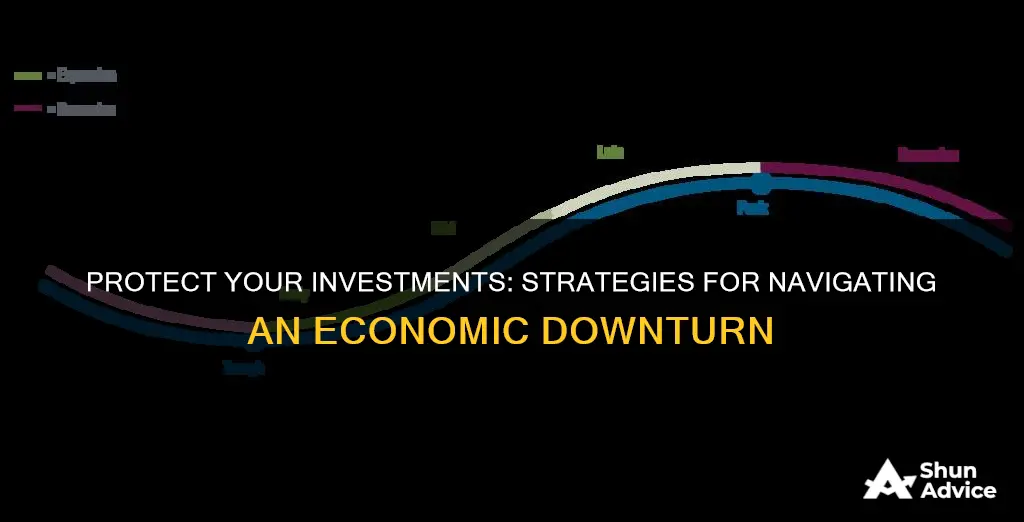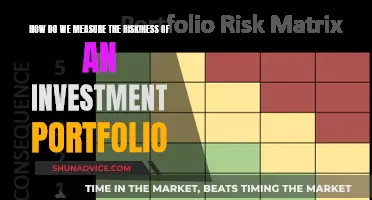
While there is no such thing as a recession-proof investment, there are strategies to limit portfolio losses and even make gains during a recession. During a recession, investors tend to turn away from riskier assets such as stocks and high-yield bonds, and towards safer investments such as U.S. Treasurys and gold. A diversified portfolio with a mix of stocks and bonds can help investors weather the challenges of a recession, while defensive sector ETFs can help take some risk off the table.
| Characteristics | Values |
|---|---|
| Portfolio type | Diversified portfolio with a mix of stocks and bonds |
| Stock type | Large-cap stocks, defensive ETFs, consumer staples, healthcare |
| Company characteristics | Low debt, profitability, strong balance sheets, positive cash flow |
| Bond type | High-quality corporate bonds, U.S. Treasury bonds, municipal bond funds |
| Other | Gold, cash reserves |
What You'll Learn

Diversify your portfolio
Diversifying your portfolio is a crucial strategy to protect your investments during a downturn. Here are some key points to consider when diversifying your portfolio:
Identify Safe-Haven Assets
Seek out investments that are traditionally considered safe havens during economic downturns. These include defensive sector exchange-traded funds (ETFs) and high-quality corporate or government bonds. Defensive sector ETFs often focus on industries like utilities, healthcare, consumer staples, and essential goods and services that people continue to need and purchase even during a recession. Examples include the iShares U.S. Consumer Staples ETF (IYK) and the Utilities Select Sector SPDR Fund (XLU). High-quality corporate bonds, also called investment-grade bonds, are issued by companies with strong financial health and a low risk of default. U.S. Treasury bonds are also considered safe due to the government's ability to levy taxes and print money, eliminating default risk.
Focus on Large, Stable Companies
Invest in shares of large, established companies with ample cash flows, strong balance sheets, low debt, and a long history of profitability. These companies are more likely to weather a downturn and continue paying dividends. They may also offer more stable investment opportunities than smaller, more volatile companies.
Consider Sector-Specific Funds
Look into funds that track specific sectors, such as healthcare and consumer staples. These sectors tend to be more resilient during recessions because they provide essential products and services that people need regardless of the economic climate. This can include companies in pharmaceuticals, food and beverages, household goods, and personal care products.
Maintain Liquidity
Ensure you have sufficient liquid assets, such as cash reserves or investments in money market funds or short-term certificates of deposit (CDs). Maintaining liquidity provides you with financial flexibility and access to funds during a downturn. It also enables you to take advantage of investment opportunities that may arise during a market correction.
Seek Professional Advice
Consider consulting a financial planner or advisor who can provide personalized guidance based on your specific circumstances and goals. They can help you construct a diversified portfolio that aligns with your risk tolerance and investment objectives. Remember, diversification is not a guarantee against losses, but it can help mitigate risk and improve your portfolio's resilience during economic downturns.
Safe Investments for Fresh Lottery Winnings?
You may want to see also

Defensive ETFs
Some popular defensive ETFs include the iShares U.S. Consumer Staples ETF (IYK) and the Utilities Select Sector SPDR Fund (XLU), which focuses on the utilities sector. The Fidelity MSCI Utilities Index ETF (FUTY) is another defensive ETF that tracks the performance of utility companies. These ETFs provide exposure to a diversified portfolio of defensive stocks, which can help investors mitigate risk and protect their portfolios during market turmoil.
Additionally, defensive ETFs can also include inverse ETFs, which allow investors to bet against the market. For example, the ProShares Short S&P 500 (SH) provides the inverse return of the S&P 500 Index. These types of defensive ETFs can be used by investors who believe the market will decline and want to profit from that downturn.
Overall, defensive ETFs can be a valuable tool for investors looking to protect their portfolios during uncertain economic times. By focusing on defensive sectors and reducing volatility, these ETFs can provide more stable returns and help investors weather the ups and downs of the market.
Managers Investing in Negative NPV Projects: Strategic Risk-Taking
You may want to see also

High-quality corporate bonds
During a recession, investors often shift towards investment-grade bonds to preserve portfolio capital. The predictable income from these bonds can help offset potential losses in the stock market. While they may not offer explosive growth, high-quality corporate bonds can provide a modest extra yield above cash or cash equivalents.
When the economy is strong, credit spreads tend to be low for corporate bonds. This is because investors and lenders don't demand high-risk compensation when the perceived risk of default is low. On the other hand, if the economic outlook deteriorates, spreads tend to rise as it can negatively impact a corporation's profitability and ability to repay debt.
Some examples of high-quality corporate bond funds include the iShares Investment Grade Bond Factor ETF, which was up 2.05% in 2023, and Columbia Corporate Income, which had a yield of 6.23% in the same year. These funds have outperformed the average corporate bond fund, demonstrating the resilience of investment-grade bonds during challenging economic periods.
Overall, high-quality corporate bonds can be a stable and relatively safe investment option during a downturn, providing predictable income and potentially higher yields compared to other safe-haven investments.
Berkshire Hathaway: Investing Guide for Indians
You may want to see also

Gold
However, gold does have its drawbacks as an investment. Firstly, the only way to make money investing in gold is if the price goes up. There is no stream of income associated with the investment, unlike stocks, bonds, and real estate, which provide income in addition to gains from price appreciation. Secondly, there are often extra costs associated with owning and storing gold, such as transportation costs and insurance. Finally, gold's track record as a hedge against inflation is mixed, with some studies showing that gold doesn't always follow inflation closely.
Investment Planning in India: Strategies for Success
You may want to see also

Large-cap stocks
While large-cap stocks are favoured for their reliable dividend payouts, this isn't guaranteed. In periods of financial strain, large-cap companies may reduce or suspend dividends, impacting income-focused investors.
Examples of profitable large-cap stocks include Nvidia and Walmart, which dominate the technology and retail sectors, respectively.
Understanding Your Options House Investments Better
You may want to see also
Frequently asked questions
There is no such thing as a "recession-proof" investment, but some tend to perform better than others during downturns. These include:
Some relatively safe investments during a downturn include:
- High-quality corporate bonds, also called investment-grade bonds
- Gold
- U.S. Treasury bonds
- Municipal bond funds
- Money market funds
- Funds that track specific sectors, such as healthcare and consumer staples
- Large-cap stocks
Here are some strategies to make your investments more recession-resistant:
- Diversify your portfolio with a mix of stocks and bonds
- Prioritize liquidity and safety by setting aside an emergency fund in a liquid account
- Consider working with a financial planner to help manage your investments and emotions
- Use a robo-advisor to determine your risk tolerance and manage your investments
Some signs of a recession include:
- Faltering confidence on the part of consumers and businesses
- Weakening employment
- Falling real incomes
- Declining sales and production







